Left: jacket WALES BONNER, jersey HERON PRESTON, shorts WILLY CHAVARRIA, headband NIKE.
Stay informed on our latest news!
Stay informed on our latest news!
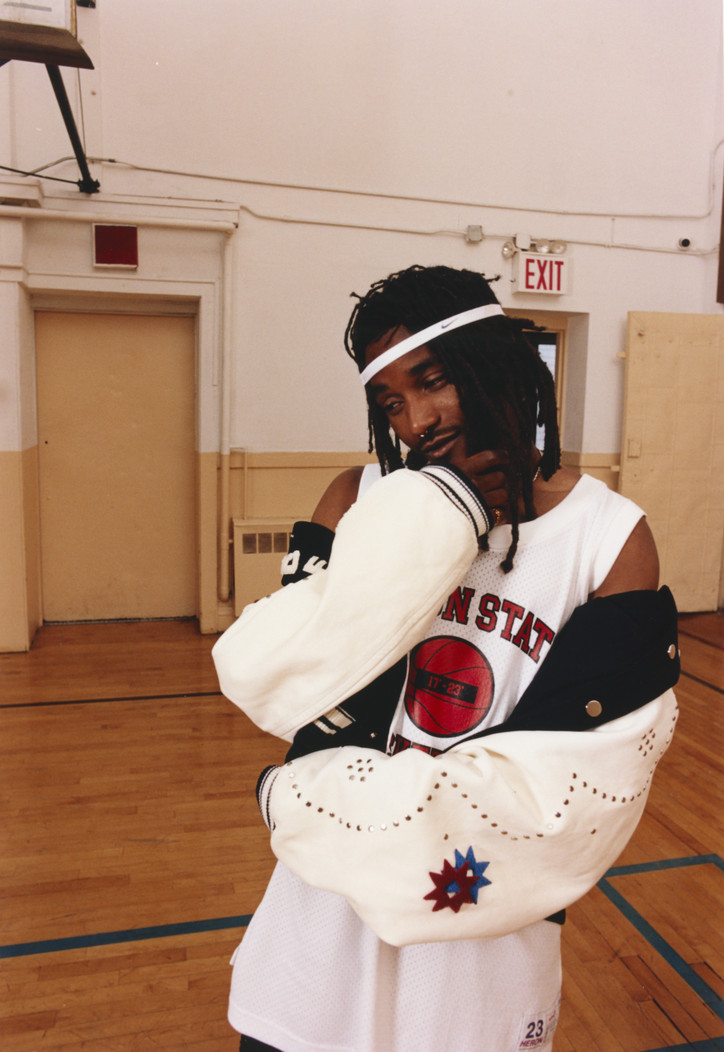
Left: jacket WALES BONNER, jersey HERON PRESTON, shorts WILLY CHAVARRIA, headband NIKE.
Aside from growing up in the Black church, Ward also says he was heavily involved in the dance community in St. Louis from an early age. At 9, his mother placed him in a musical theater program where he learned tap, jazz, ballet and hip-hop. He acted, sang, and danced for years, due to his excellent dancing skills and involvement in competitions, he was constantly traveling. Jordan’s aspirations to move to Los Angeles guided him and by 18 he moved there to pursue professional dancing.
After some time there, he landed a gig touring as a backup dancer for Becky G. While on the road, he found himself drawn to creating music while cooped up in his hotels – Becky G. encouraged him too. Though it felt foreign for him at first, he began doing what felt natural for him: writing and singing about his life as a dancer on the road. By the time 2015 came, he was hired as a backup dancer for Justin Bieber as a part of the singer’s Purpose tour. This led to Ward striking up a friendship with a talented artist and dancer who pushed him to start freestyling and recording, he stayed consistent and within a year and a half he released his first EP, A Peak At The Summit.
FORWARD released on Interscope Records has so many layers and that’s what lands Ward in the lexicon of rising alt acts who once were inspired by distinct eras of hip-hop: think the blog era where artists like Wiz Khalifa and J. Cole got their footing (Jordan looks up to both of these acts). In conversation, the artist-rapper expresses that FORWARD paints a picture of where he’s at right now as a music-maker. But, it also does more than that, it introduces him to new listeners by way of fleshed-out arrangements by Lido, the album’s executive producer and Ward’s honest lyricism. These notions when paired with hip-hop, gospel and rhythm and blues influences create a fusion sound that culminates with Ward ushering in a reflective chapter of his artistry.
office caught up with Jordan Ward following his first headlining tour to speak about his influences, his creative childhood and his background in St. Louis, and more.
What were some of your earliest music memories?
The Miseducation of Lauryn Hill was just one of those CDs that I just remember always being in my house since I was a kid. And I would always pick it up and listen to it, and it followed me into my adulthood. Other than that, I mean, I grew up around a lot of gospel music.

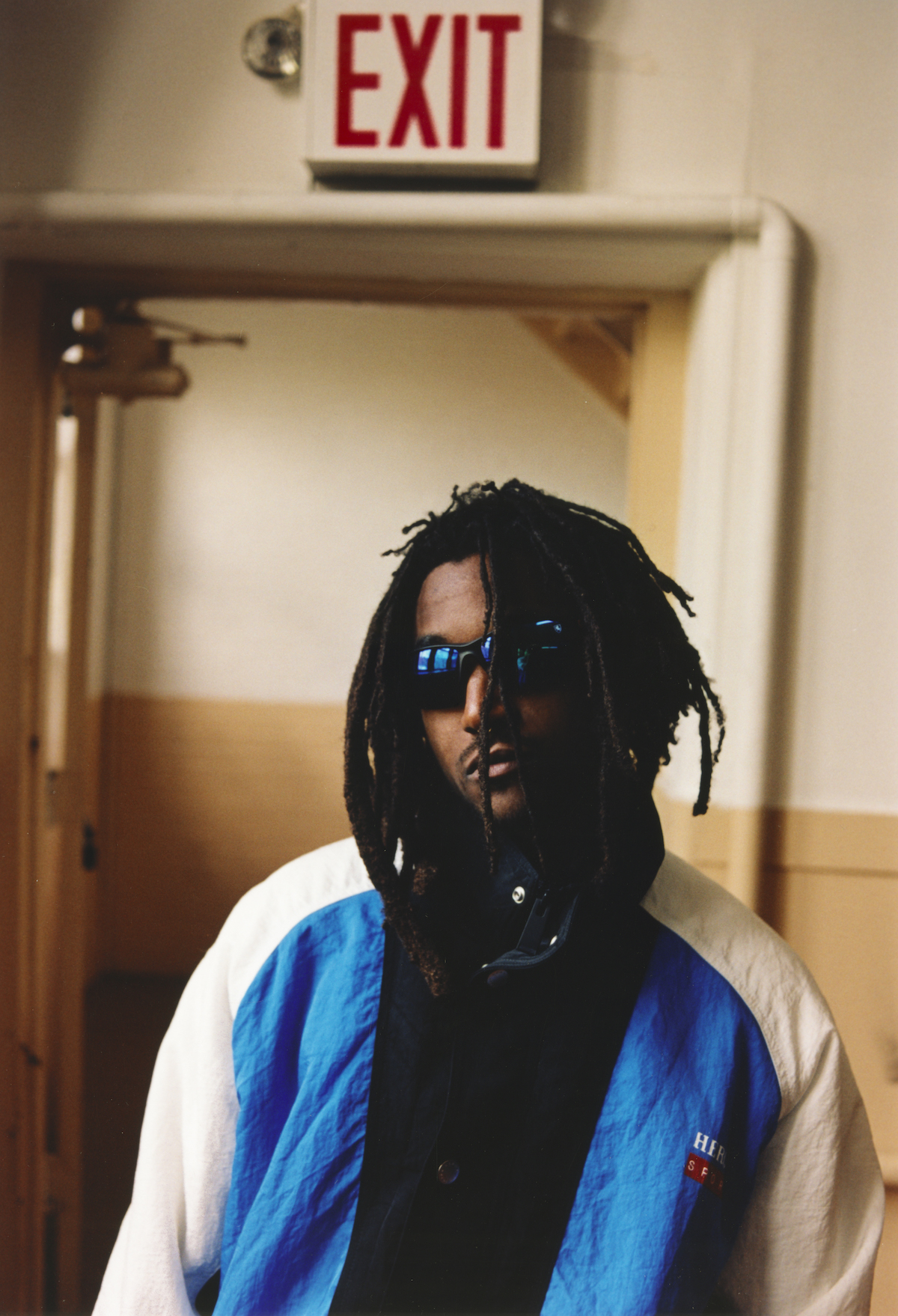
Left: jacket WALES BONNER, jersey HERON PRESTON, shorts WILLY CHAVARRIA, boots TIMBERLAND, headband NIKE.
Right: jacket HERON PRESTON, sunglasses STYLIST'S OWN.
How old were you when you started getting involved with creative activities like musical theater, dancing and more?
I remember being drawn to singing and dancing and rapping ever since I was a kid, ever since I can remember. But the first time I actually got involved was when I was eight or nine and I started doing musical theater. My mom had noticed I was getting in trouble for singing and dancing in class. So basically she was just like, "Let me just switch you with some singing and dancing." So she sent me to some musical theater auditions.
I started doing community theater, professional theater. And then when I was nine, I started dancing, started taking tap, and then when I was 10, I joined my dance studio and I was like a competition kid. I was a convention kid. As a kid, I always just wrote raps, had rhyme books, battled people at the YMCA lock-ins and around neighborhood and stuff. I had a big community in the musical theater realm. And then within the dance studio culture in St. Louis, I knew a lof of kids from competing.
What other types of music were you listening to as you were growing up?
Other than gospel, I mean, coming up as a kid, I was big on 50 Cent. And then right before middle school, I got more into 2Pac’s Me Against the World and Nas’ Illmatic. I like All Eyez On Me too. Biggie’s Ready to Die, JAY-Z’s Reasonable Doubt. I was on my real hip-hop shit as a kid. I started listening to all that when I was like 10.
Were you creating music as a part of the SoundCloud era in middle school or high school?
I never made music as a kid. I used to just rap, write raps. I recorded one demo in my friend's basement because her dad was a church musician and he had a studio. By the time I got to high school, I was way more focused on dance.
In high school, I wasn't thinking about being an artist at all. I was just focused on being ready to move to LA when I was 18, to start my career and shit. But I definitely was super into music though. If anything, I thought I was going to go from dance to the music industry, but just in a different way. I came up on the Lil Wayne No Ceilings era, the Wiz Khalifa “Taylor Gang” era, coming home, watching Wiz Khalifa YouTube videos “DayToday” every day, watching Mac Miller, watching just even early Tyler, The Creator and Drake.
I was traveling a lot for dance. Every weekend I would fly to these different workshops around the country and try to get on scholarships so I can train more throughout the year. And I would be flying by myself a ton. So I always just had music with me. And I feel like that combination inspired my view on the world a lot.
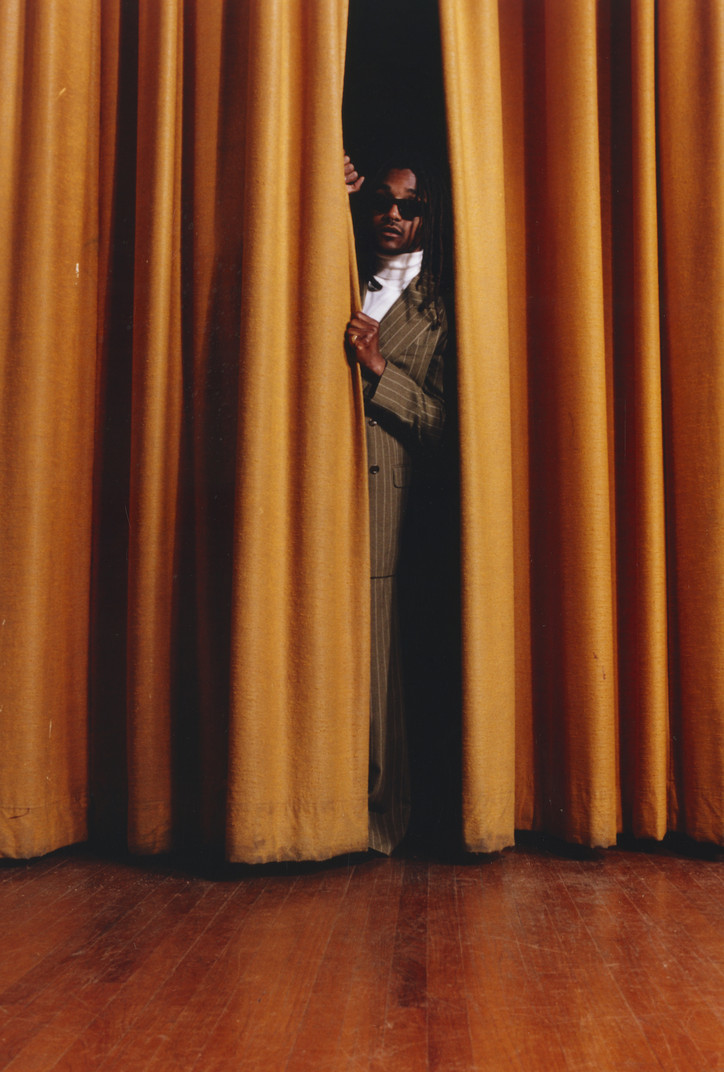
Jacket, pants and shoes GUCCI, top HERMES, sunglasses FLATLIST, rings MIANSAI.
Do you think you’ve taken anything from the blog era and used it as a part of your artistry?
For sure. I mean, I feel like the blog era artists lay it like a new blueprint for artists. As far as putting yourself on the internet, branding yourself. My YouTube series “PlantainGo!” is definitely inspired by Wiz Khalifa’s “DayToday.” I'm trying to carry that era with me – everything from the merch to just the community recognition.
What inspires me from that era and what I try to bring with me is that the internet allowed people with different personalities. It allowed for a different set of representation. When I saw these artists on the internet that maybe came from a similar community that I came from, but was different from a lot of the people they came up around inspired me.
People like Wiz Khalifa and J Cole, they made me feel I could identify with them as a young Black kid growing up in the inner city that didn't talk like everybody, or didn't necessarily dress like everybody. I was doing contemporary dance and doing ballet and getting music from what I would be doing with that, studying at my studio and stuff. And I would see them be tapped into the same music too. So I feel like it's just inspiring.
How did you transition from dancing to creating music? Especially since you initially moved to Los Angeles to chase your dreams of being a professional dancer.
By the time I actually started working professionally as a dancer, the last thing I wanted to do was become an artist. I feel like there's an unspoken code you assume as a dancer when it's just, you just become more ninja like. You're only there when you need to. You not asked. At least the way I was thinking about, I'm not asking for extra attention. The only thing I want to speak for me is did I do my fucking job. I was touring with Becky G for a year. Becky would just hear me sing, playing around sometimes, and she’d be like, “Just sing a little something for me.” And I’d be like, “What are you talking about?” Then maybe a year and a half after that is when I started fucking around with the music.
I was on tour with Justin Bieber in 2016 with my friend, he was another dancer and performer. We just had a lot of free time in the hotel rooms, and he's an amazing artist. So he would be making music on his laptop, and then I would just be free styling for fun next to him. And then he was like, "Bro, you should fuck around with that." And then I started writing raps, and then pretty much all my free time on tour became me just getting recording equipment and recording demos in my hotel room.
I spent the next year and a half being in my hotel room, hooking up my mic, instead of going out and drinking with everybody all the time, I would just be pulling beats off YouTube and just seeing what I could do living in my own little world before I touched down back in LA. And by the time I came off tour, I had a tape and I started going to the studio on my breaks in between booking studio time in LA. By the end of 2017, I had a tape and I put an EP out, and then yeah, it just started from there.
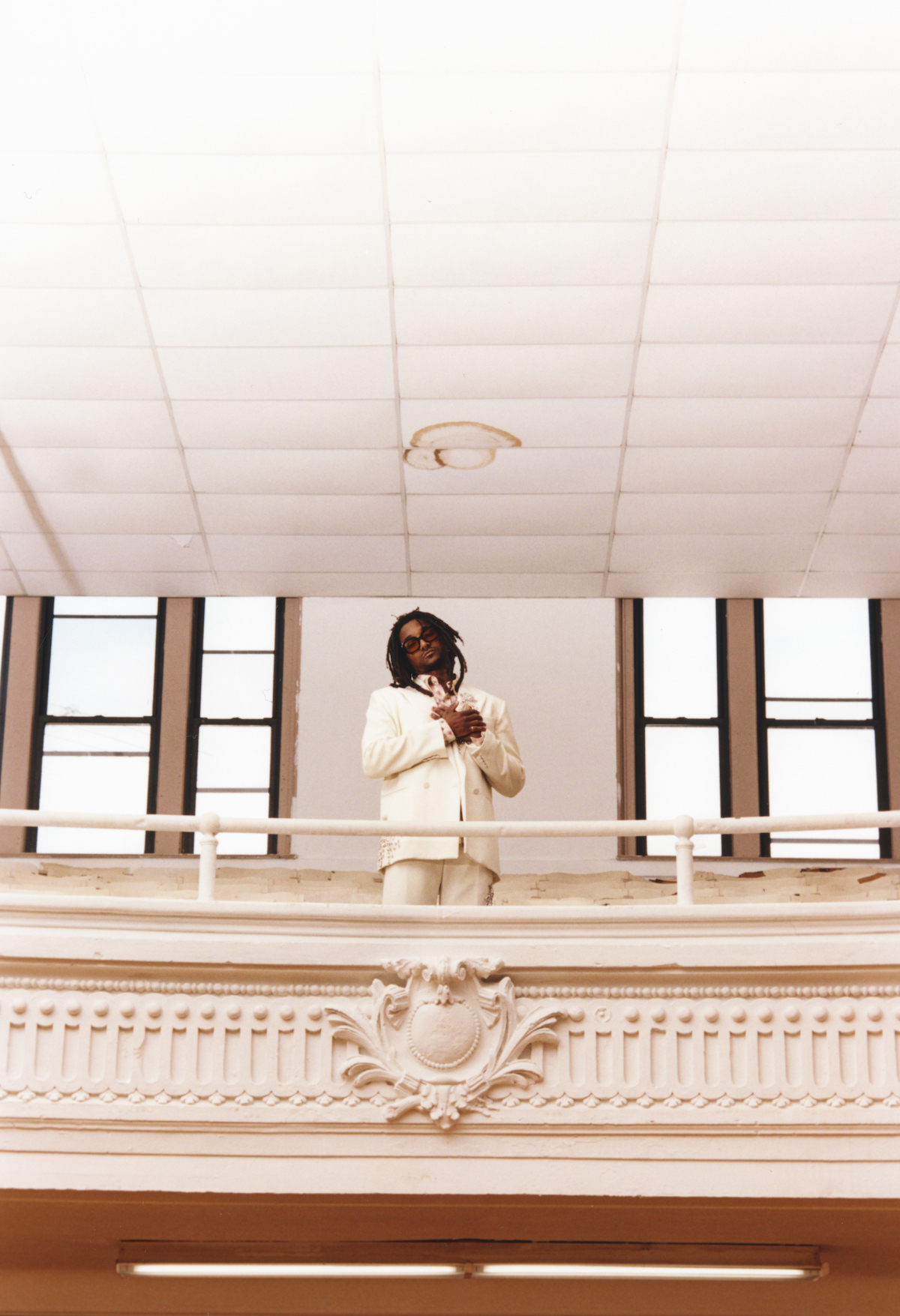
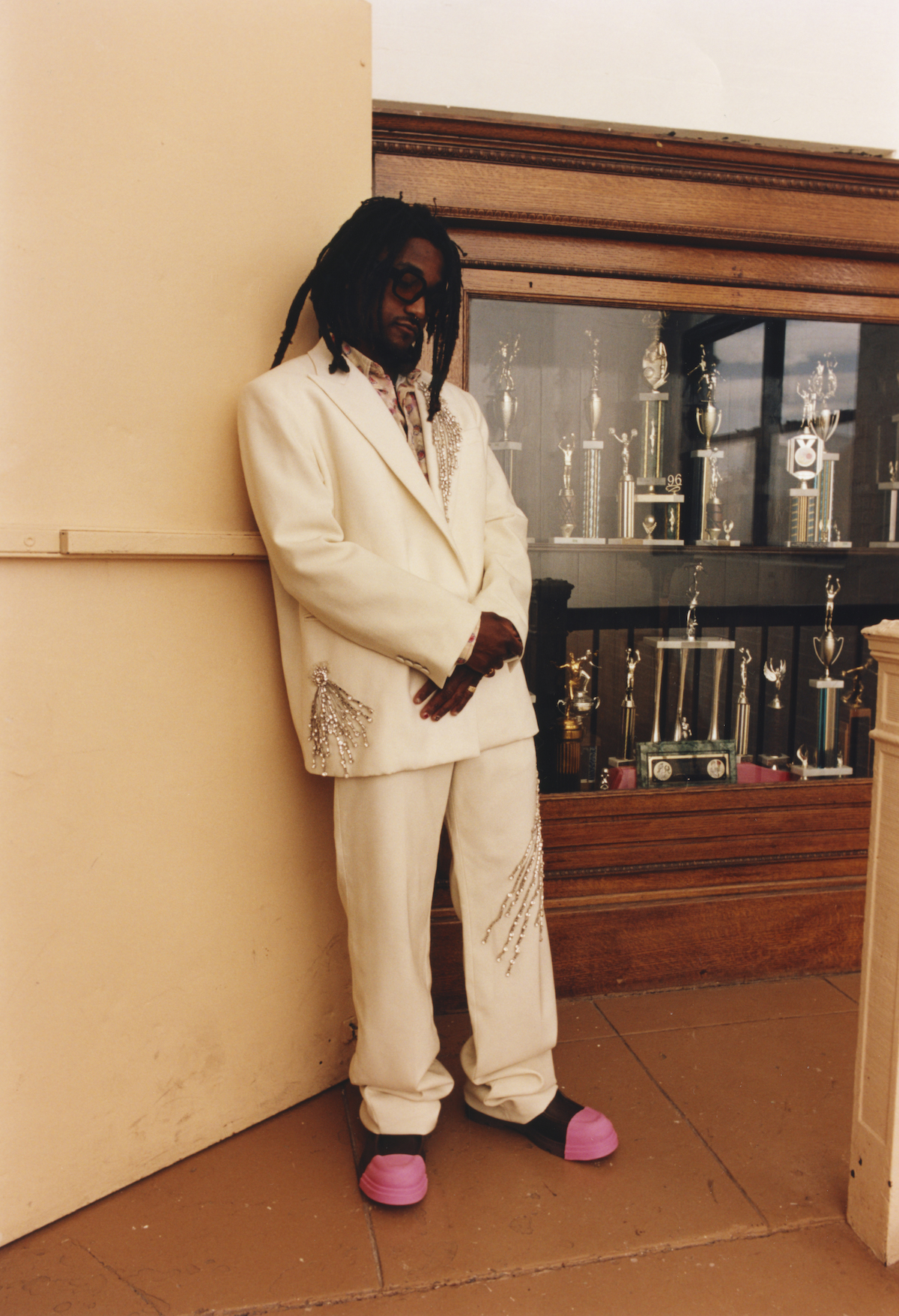
Jacket and pants ALEXANDER McQUEEN, shirt ACNE STUDIOS, shoes CAMPER, sunglasses FLATLIST, rings MIANSAI.
With your debut album FORWARD do you have any lessons or themes that you took from your first project?
I feel like I'm just always trying to evolve. I'm never trying to do the same thing twice. So on that first tape, I feel like I was describing where I was in life. It was called A Peak At The Summit, which is basically me describing being at one peak of dance and then looking over at the next peak or the next summit of music and being like, "Damn, I got to go through that journey to go up and down." And I feel like, so on that tape, I was talking about my current life being a dancer and my current relationships. And I feel like on FORWARD, I tried to go a little bit before that and talk about my childhood and my family. And I mean, it's music at the end of the day. It's not a tell all or anything, but I feel like I just tried to show a little bit, give a little more context behind it.
What were the biggest themes you were hoping to get across on FORWARD?
I was just trying to illustrate what I was feeling on the inside. At the most basic level, I was just trying to show my evolution as a human being, try to give more context as to why I choose to express myself the way I do, why I have the humor that I do, why I have the emotion that I do, why I have the passion that I do, because of everything that's led me up until this point. And I'm not sure why, but I was just trying to paint the picture as to what led up here.
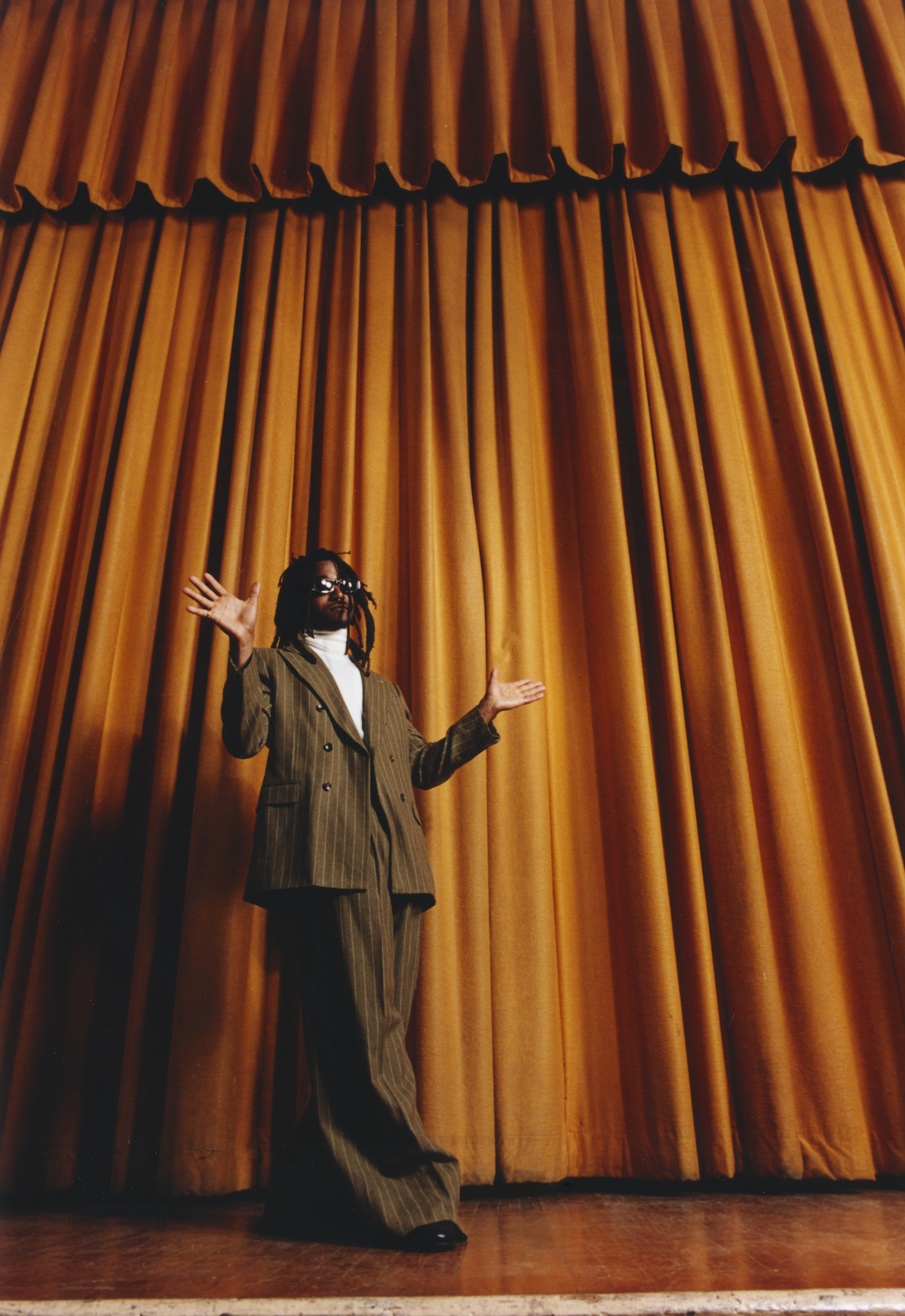
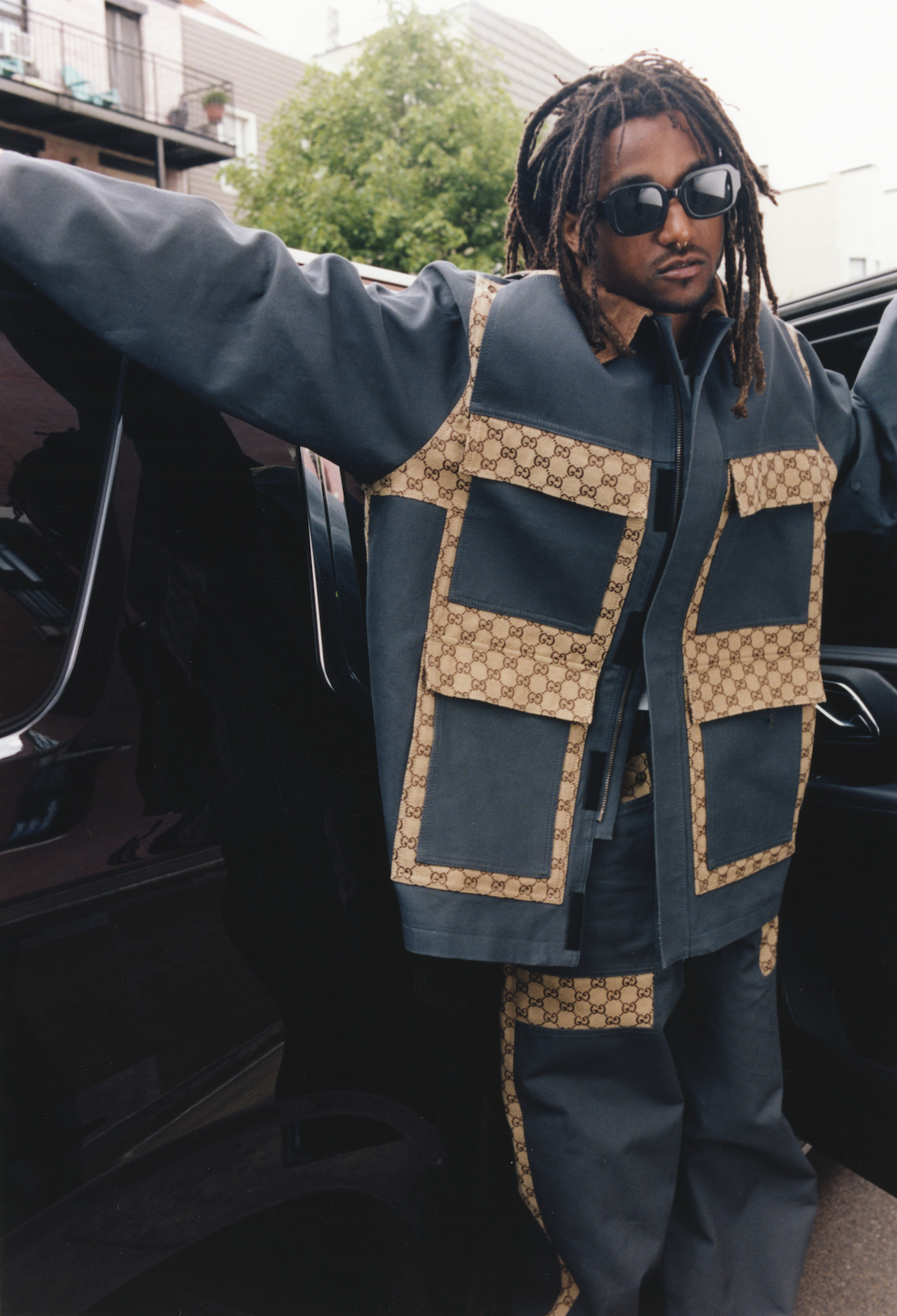
Left: jacket, pants and shoes GUCCI, top HERMES, sunglasses FLATLIST, rings MIANSAI. Right: jacket and pants GUCCI, sunglasses FLATLIST.
What was the process of creating FORWARD?
Everything was recorded in LA except “IDC” with me and Joony. We made that in New York. We were both in New York at the same time, and that was our first time meeting. But everything else was made in LA. We worked a lot in Lido’s studio. Lido has a home studio, so I was at Lido's crib a lot. There are a lot of the producers on the album, I would just be at their crib. The intro “BUSSDOWN,” produced by my homie, Eli Heisler, I was at his crib when we made that.
All of us came together, myself and the producers, and we rented some houses out throughout the year. One in Malibu, one in Topanga, one in Venice. And just spent four or five days at a time, just locked in, making different ideas, taking mushrooms, going to the beach in between, coming back, trying something else. There was definitely a sense of camaraderie.
I’m curious about the fusion sound you landed on, on the album too. I don't want to say that it's R&B or anything, because I'm not sure what you want to define yourself as, but I'm just curious. Was that a decision that you came up with Lido you executive producer, that you just didn't want to confine yourself to any genre?
I'm not the first to do any of this shit. You know what I'm saying? I'm inspired by mad people. But yeah, I guess, I mean, I don't know if we was sitting in there like, “I don't want to be confined to one genre.” I don't think we stay in one genre. Going back to what I was talking about earlier as far as what I was so inspired by on the blog era, is that you could really hear all these artists' influence.
I don't really mind what genre people put it in. I feel like that's not my job. I like to consider myself a hip-hop artist. I'm not going to call myself a rapper, but I like to consider myself a hip-hop artist. But ultimately, most things are just rhythm and blues derivatives. Rhythm and blues is the ultimate genre after blues and gospel and jazz and all that.
I never want to pigeonhole black artists. What if the artist actually doesn't want to be canonized and placed definitively in a lane?
Since you said that, I'm going to just go ahead and insert that right there. I mean, Chuck Barry, father of rock ‘n’ roll from St. Louis. Tina Turner, queen of rock ‘n’ roll, also from St. Louis.
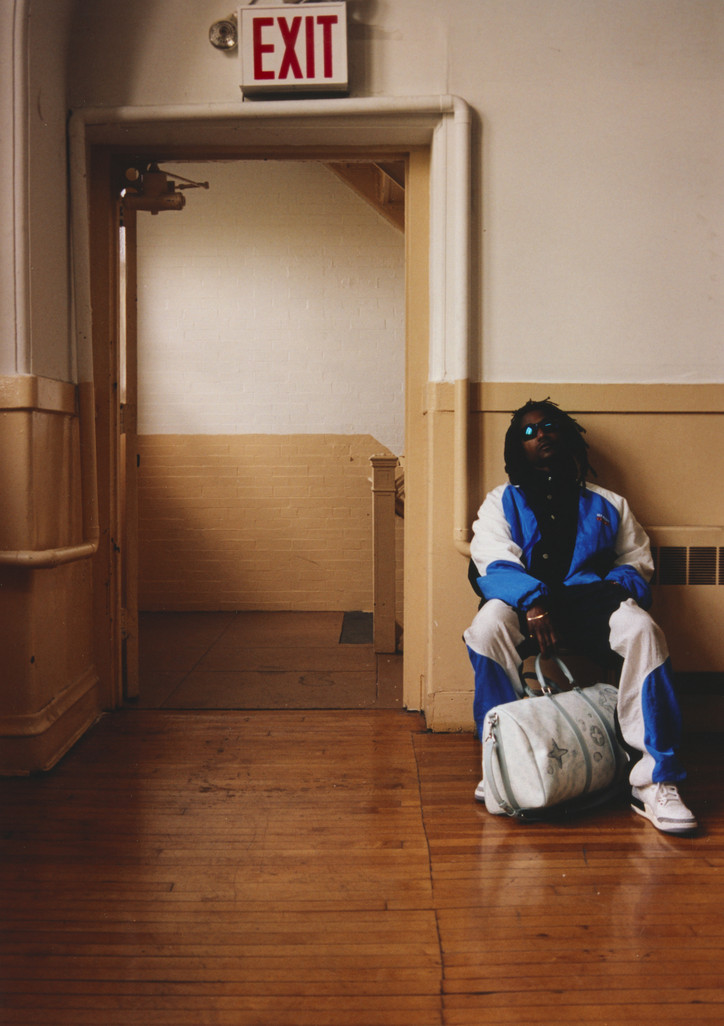
Jacket and pants HERON PRESTON, shoes JORDAN BRAND, bag LOUIS VUITTON.
What was it like collaborating with your friend and stylist Angelo as you were piecing together the album?
I’ve known Angelo since like 2014. We both came up in a similar dance circuit as kids to adults and ended up on similar career paths. But me and him have been friends before I ever started making music, before he started pursuing fashion professionally. We both have gone through financial ups and downs together, real life ups and downs, relationships, all that. I've slept on his couch.
He's seen how my tastes and everything have shaped over the years, why they've shaped that way, how everything has influenced what I do. And I've also seen him evolve as just a fashion creative, and I think we just both have a trust in each other. And now he knows where I'm at with the music. I know where he's at with the fashion, and we both want to take each other to the next level.
How would you describe this chapter of your life?
This chapter is about reaching the fullest potential. I don't even just mean that in just music because my journey with music isn't about becoming as big as I can. It's about being the best artist that I can be genuinely. Of course, I would love to travel the world, and I would love to create financial freedom and create a freedom for me and my loved ones. So I feel like you have to create something sizeable naturally to do that. But to me, it's just about really bringing to life everything that God or the Spirit has put on my heart.
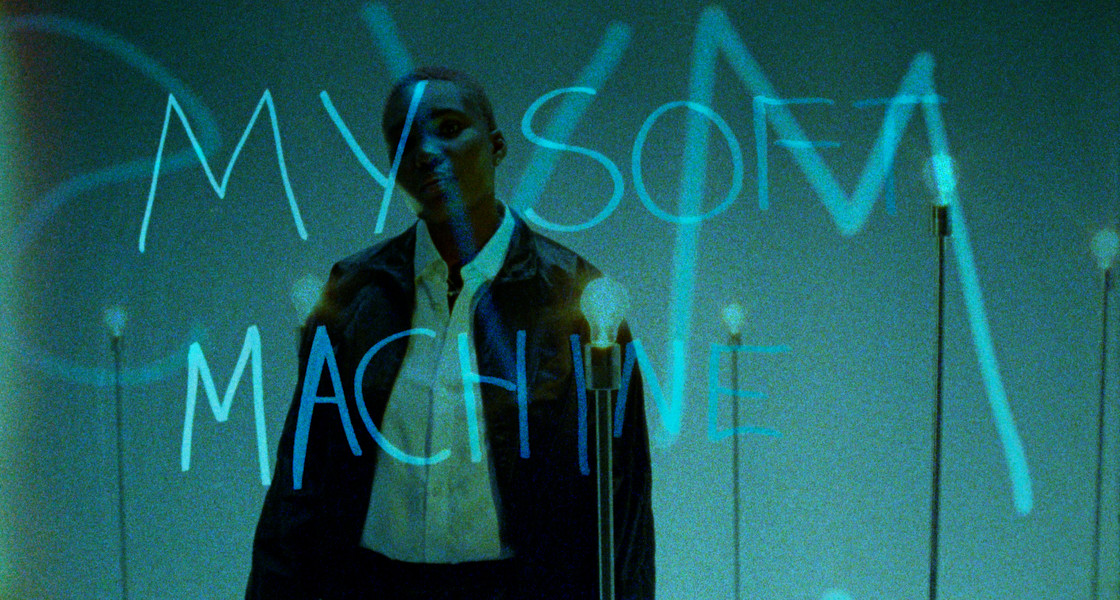
In her own words, Arlo describes how writing has become her refuge — an outlet for releasing emotional tension, constructing alternate realms beyond her own, and unraveling the complexities of life's challenges. She is set to release her debut poetry anthology, THE MAGIC BORDER: Poetry and Fragments from My Soft Machine, with Harper Collins (4th Estate and Dey Street) this fall, further exemplifying her written prowess. The collection includes not only twenty new and original poems but also the complete lyrical compositions from her album.
Read our exclusive interview with the singer-songwriter below.
Hey, how’s your day going?
Hey, my day’s going okay — I’m writing to you from an airport in Salzburg, Austria with a black coffee in hand; it’s surrounded by snowcapped mountains; I feel like I spend most of my life in airports.
You're in the airport and you can only listen to King Krule or Frank Ocean, which one do you choose?
I think it would have to be Frank Ocean — there’s something in the layers, the humanity, and the wounded beauty of his songs that I could truly find something new in for the rest of my life.
What about three of your favorite words in English and French?
Boulder; ribbons; starry. Mercure; pomme; ange.
How did you get started with writing?
I was a very emotional, imaginative, energetic kid. Writing became a way to release emotional tension, build worlds outside of my own, and unbraid myself from difficult things. I don’t remember ever sitting down and deciding to write, it kind of just happened.
Do you remember your first song?
I can’t really remember my first song — it was probably something Elliott Smith adjacent using the chords to “Last Christmas” because those were the only ones I knew. I think it was homework from my first guitar teacher.
I heard a lot of punk influence on My Soft Machine. What inspired this shift?
I was just listening to a lot of guitar music in general — Nine Inch Nails, Deftones, MBV, Broadcast — I like the essence of punk, of living outside the box — that was a guiding force for me.
How has your sound evolved since Super Sad Generation?
It has evolved in a million different directions, I’ve become more experimental and more comfortable with shapeshifting and plunging into the deep end with no parachute. I’ve built a beautiful musical family around myself that brought all kinds of new elements to My Soft Machine — whether that be percussion or guitar work or vocal treatment or energy. I’ve grown a lot in the last 5.5 years.
Describe the album in three words.
Open heart surgery.
What was the writing process like?
It was the same as always, I collected words, phrases, text messages, and fragments of conversation, and spent a lot of time alone, fueling up. Then I went into the studio with my friends and built stories around the chords they gave me or I demoed in my bedroom — I find a lot of comfort from consistency in a writing sense.
How do you know when a song is finished?
I never really do honestly. I just look myself in the eye and ask myself if it is as beautiful as it can be. If the answer is yes then it’s finished.
Which song are you most excited to perform?
Definitely "Devotion", I love thrashing my guitar and shouting into the noise and almost falling over every time.
[This video was made possible by WORTHLESSSTUDIOS - the Brooklyn based not-for-profit that supports young career artists by providing materials, tools, space and technical assistance to help them realize their creative visions.]
Fashion Credits
1st Look - TOTAL LOOK ALEXANDER MCQUEEN. SOCKS FALKE.
2nd Look - FERRAGAMO.
3rd Look - COAT WILLY CHAVARRIA. SWEATER AMI. PANTS ACNE STUDIOS. SHOES CAMPER.
4th Look - JACKET AND PANTS WILLY CHAVARRIA. SHIRT BOSS. SHOES ACNE STUDIOS.
5th Look - HOODIE AND PANTS ACNE STUDIOS. SHOES ZEGNA.
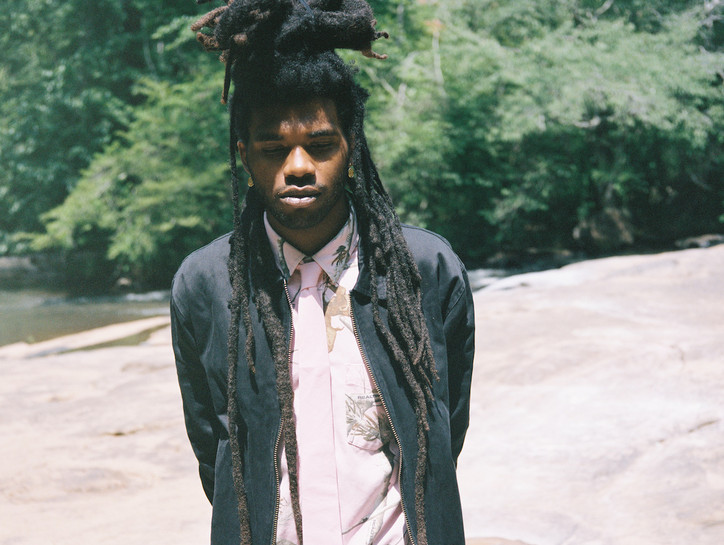
Fast forward a decade, and Chester Watson continues to make waves in the music scene. He has established himself as an Afrosurrealist, tapping into the intrinsic groove that resonates within Black cultures across the globe. With his latest album, "fish don't climb trees," Chester carries on the centuries-long narrative of Black individuals existing beneath the water's surface, amidst the vibrant flora and fauna. It's a surreal palette that he masterfully paints, yet "fish don't climb trees" also represents his most grounded and introspective work to date. Describing it as a cosmic descent, Chester invites listeners into a transcendent journey through his music.
office said down with Chester to discuss the importance of subtlety, consistency and his love for his fans. Step into the psyche of one of Rap’s most unique artists.
Nice to meet you. How are you?
Good. How are you?
Good. Good. I actually used to talk to you a little bit on Tumblr man. So it's like, wow. 10 years later man, I was bumping you back in like 2013.
Yeah, I lost that old Tumblr. I'm kind of sick about that. But that's crazy that you actually were tapping in on that one.
What have you been up to since you last dropped in 2021?
I’ve been trying to figure out how to package my vision and message, the right way to put it together. I’ve been finding myself post pandemic, like most of us.
How do you feel your sound has evolved from "Phantom" to this latest album?
I've made a lot of moves since then, you know, in life and in music. With my last ep, 1997 I’m up in the clouds on the cover.
That's why on the new album cover, I'm a little closer to the ground. And that was me falling from the cosmos, the bars are a little closer to reality.
I can definitely see that from listening to the new album. Even in your earlier work, there’s so much surrealism and fantasy. How do you feel about being labeled as an Afro surrealist?
I take pride in it. I feel like that's definitely something that I try to push. I feel like Surrealism is closely tied to Europe and European artists.
Nothing against them, but there's always been surrealism in African art and art in general. I’m kind of like a continuation of that lineage.
Yeah, yeah. Talking about Africa and the ancestors, I peeped that Sun Ra sample. Who do you look to for guidance?
Definitely, Sun Ra. I really look to anyone under that avant garde umbrella. I tap into Sun Ra, Madlib, anything that sounds bugged out. They do a lot of percussion and African music is very percussion heavy.
I would say Latin music is very percussion heavy as well, especially, when it comes to vibe and groove. That groove is kind of native to us, that rhythm.
Walk me through your process? Is it intuitive?
Yeah, it's more like I experienced something and then I try to capture that in the best way possible. Life is very surreal.
Think about it like a camera. It's not about what you're shooting, it's about how you're shooting it. I want it to be relatable but I slightly tilt the angle and that’s what makes it surreal.
Subtlety is powerful. I think that's something I learned on this project.
I’m really tapping into this idea of subtlety with getting your ideas across. With fish don't climb trees what concepts and ideas do you want us to take away from it?
Well, honestly I want people to live with it. I want it to be a project that people build their own experience. I'm juggling things that pretty much everybody juggles. I’m thinking bout the song Money_ Love.
Money is this man made construct and love is very metaphysical. So I’m interested in these two concepts and how they interact with each other in the grand scheme of life.
Yeah, I was watching one of your old interviews, and I remember you talked about this idea of love being sacrifice. Do you feel like your definition of love is the same?
It’s definitely grown, I feel like I've always seen love as something that's very important and integral to growing.
In the last few years, I’ve learned the distinction between real love and fake love, as well. There's people who want to be a part of the love but for the wrong reasons and people who want to be a part of the community but for the wrong reasons.
Keying in on community and friends, what is the Nü Age Syndicate up to these days?
Man they’re chillin. So basically Kent’s working on something and it's really just me, Kent and Nick at this point. Nick still drawing and making art. He has a clothing line coming out. Kent’s working as he always is. Getting money, making music.
So it's just good to see everybody still kind of in the same mode, if not more, so in it. You know, 10 years later?
How does it feel listening to your old work 10 years later?
Ooo, different. Sometimes, I just turn it off. My girl she’ll be like, why did you turn that off? I'm like I don't know, it's not a bad song, but sometimes I’ll listen and just feel like wow, you wrote this at 15, 16, 17.
A lot of the shit that I wrote then I wouldn't write now, just because I'm not in that same headspace.
Do you have any favorite bars?
The song "Sweet" and "Bog Me Čuva" off Tin Wookie. Tin Wookie in general had a lot of hits. There’s some songs I look back on and just think, bro, how did you piece that together like that?
Let me look and see. I gotta look up my own lyrics, that’s crazy. "Purple leaves" is one of them. It's like damn, bro, the flows and the music behind it was just like, bro, you were really onto something with that.
Something that's really standing out today is this idea of consistency. How do you stay consistent in making music?
Staying consistent is just about knowing that your vision is right and knowing that what you're doing is true to who you are. Don’t get me wrong, it's okay to be selfish in music but at the end of the day, you have so many people who are invested in what you say and do.
You have to stay true to yourself, I feel like a lot of people lose sight of that.
You're really good at showing love to your fans, what kind of relationship do you have with them?
Ah Man, I try to maintain a good relationship with everybody, especially the people who support me and who really go hard for my word and my vision. I have one homie, they were a fan but we follow each other now and stay tapped in.
They got the A Japanese Horror Film samurai tatted on them. It's just like wow, bro, people are willing to endure pain for you. It’s realizing that they may have gone through pain to your music.
That goes to your earlier point of wanting this album to be something people live with. What does that look like for you?
Oh, man, for me that means literally having different favorite songs at different times. Right now I’ve been bumping this Larry June/Alchemist album and having different songs that are my go to.
That’s what I want for this album, that you’ll find a new love with a different song or a new love with the same song through whatever you may be going through.
What mindset were you in for different songs on albums?
So, yeah off the top. For "Fish Don_t Climb Trees", I made it after I saw my pops, he's a keyboardist and has worked with a lot of influential funk groups. He even worked with Three 6 Mafia.
I went to Memphis last year. So much music history there and Three 6 Mafia, rappers just rob them.
They’re just so influential, it's crazy. Like this man literally just got fuckin platinum records for that shit, and I'm just like bruh. My pops helped me clear the sample on that first song too, so that first song is really tied to my dad and our relationship. It really sets the tone for what to expect.
On "East End", I was on the east end in London and wanted to capture the moment. "Eyes Closed" is more of the build up and "Tourniquet" is like the explosion.
"Money_love" and "Bora Bora" are about exploring love and what that can mean. Then, "Daze" is really just a breather. That leads into "Gray Theory", which is about living in the gray area of reality.
"I Feel Alive", that one was actually the last song I made on the album. I made it after this trip with my girl to Florida. We sat for hours and watched the fireworks on the beach. T
hen, that goes into "Spirits" where it's like, alright, let's get back home safely. And then "Mirrors" is kind of just a lead into whatever’s next.
Thanks for going through every song, I know on "Mirror", you rap about revolution. What would a liberation album for Black people sound like?
A liberation album, it would have hella people on it. You know when you buy a world music vinyl, it would sound like that. It'd be a lot of crescendos, a lot of ups and downs.
But that's, you know, the Black existence in general. So I feel like it'd be very similar to that and try to convey that as accurately as possible.
I noticed the ear prosthetic in the last video “Eyes Closed”. What were some of your visual inspirations for the album?
The main visual inspiration was Creature from the Black Lagoon. It's very subtle, though. It's just like okay, he just got some weird ears on. But It's like, nah, it's a really deep horror nod. But it's crazy.
Because, technically, the Creature from the Black Lagoon is a fish that climbs trees. He's a fish out of water and can be on land.
Throughout history, so many people have nodded towards mermaids and fish people. I don't know where this story came from but there's this concept that the slaves who jumped off the ships turned into mermaids.
The electronic band Drexciya that's like their whole thing.
That's what it is. That's exactly what it is. Yeah. It’s deep rooted, and I just feel like I'm a continuation of that lineage. Right?
So talking about that continuation of lineage and homage. Is music part of your spiritual practice?
Yeah, for sure. Sometimes I'll make beats just to zone out to for hours and never release them. At this point, music is something I do religiously.
It's a powerful vessel, it’s a vibration. You're tuning yourself, you have to fine tune it until you get it right.